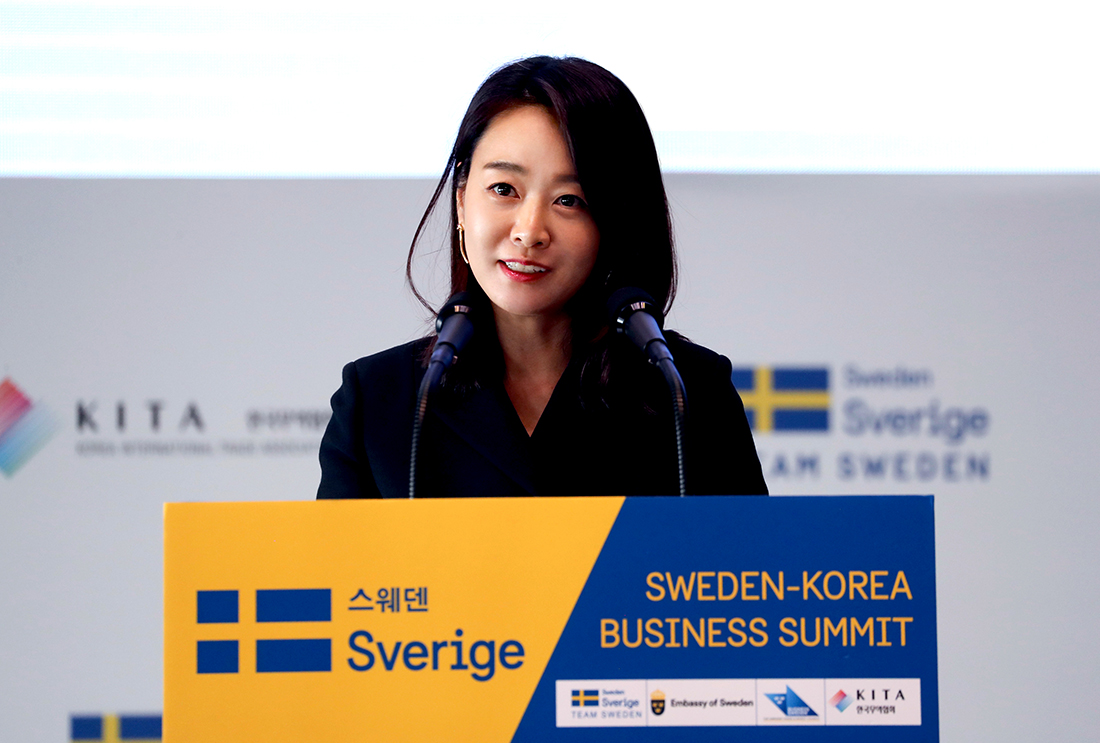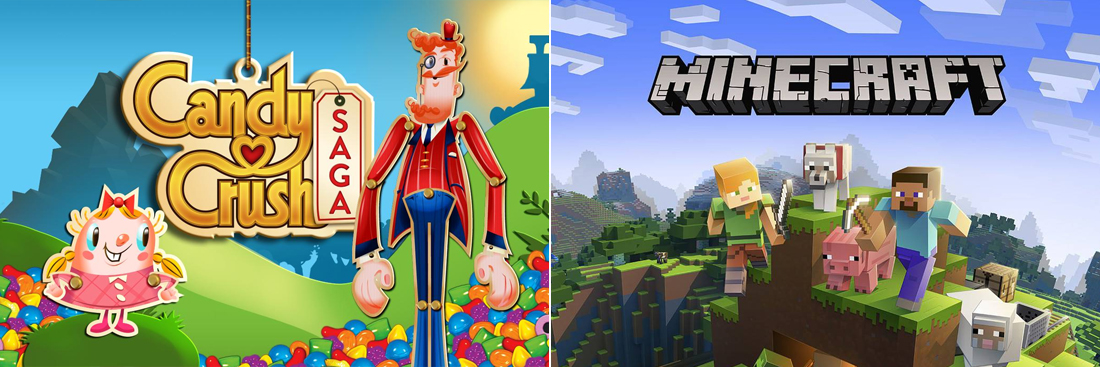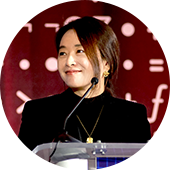게임 업계는 누구보다 AI에 주목합니다. 이미 AI 기술은 게이머의 경험을 개선시킬 뿐만 아니라, 개발자의 불필요한 작업을 대체하며 개발 과정을 효율적으로 재편하고 있습니다.
하지만 지난 칼럼 ‘AI 시대의 윤리’에서도 다뤘듯이 우리는 AI 기술이 지닌 잠재적인 위험에 주목할 필요가 있습니다. 이미 다양한 분야에서 경각심을 느끼고, AI를 위한 가이드라인이 필요하다는 목소리를 내고 있습니다. < GAMES & US >는 이 당면한 과제를 풀어나가 보겠습니다. 게임 산업은 즐거움을 향한 열정으로 자율규제를 이행해 왔습니다. 정부 규제를 거스르지 않으면서 게이머의 즐거움을 해치지 않는 방법을 끊임없이 고민해 온 것입니다. 오랜 기간 쌓아온 이 노하우가 어떻게 해결의 실마리를 제공해 줄 수 있을지 함께 고민할 수 있는 시간이 되길 바랍니다.
이 칼럼은 Global CSO 윤송이의 ‘한국-스웨덴 비즈니스 서밋 프로그램’의 발표문을 옮긴 것입니다. 원문도 함께 첨부합니다.
스웨덴 게임 산업의 성장 과정은 우리 대한민국의 게임 산업과 매우 닮아 있습니다. 스웨덴이 게임 시장에서 두각을 나타내기 시작한 건 그리 오래된 일이 아닙니다. 스웨덴의 게임 산업은 1980년대 초, Amiga와 Commodore 64s를 기반으로 한 개발자들의 열정에서 탄생했습니다. 이 아마추어 개발자들의 대담한 움직임은 1990년대에 이르러, 게임을 하나의 산업으로 발전시켰습니다. 스웨덴이 게임 개발의 강국이 된 건 열정적인 개발자들 덕분입니다.
스웨덴 게임 산업의 발전에서 가장 인상 깊은 점은 게임에 접근하는 방식입니다. 그들은 게임 개발을 단순히 비즈니스로 보지 않고, 하나의 문화로서 뿌리내리도록 만들었습니다. 스웨덴에서 시작된 ‘드림핵(Dreamhack) 페스티벌*’은 e스포츠가 세계적으로 성장할 수 있는 토대가 되었고, 스웨덴 개발자들이 만든 스카이프(Skype), 지라(Jira) 등의 소프트웨어는 엔씨의 직원들도 매일 사용할 만큼 전 세계 개발자들이 사용하는 프로그램입니다. 또 스웨덴의 개발자들은 그들의 문화가 투영된 게임을 개발할 때 결코 타협하는 법이 없습니다. 스웨덴을 대표하는 게임 ‘마인크래프트’와 ‘캔디크러시’ 등은 북유럽 문화의 혼이 담겨 있으면서도 세계적으로 사랑받는 게임입니다.
*드림핵(Dreamhack) 페스티벌: 세계 최대의 컴퓨터 축제로 기네스 세계 기록에 세계에서 가장 큰 규모의 LAN 파티로 등재되었다.
반도국가인 스웨덴과 한국은 공통점이 많습니다. 1980년대 후반까지, 한국의 게임 개발 수준 또한 그리 높지 않았습니다. 스웨덴이 미국이나 영국 같은 큰 시장들 사이에서 고군분투했듯, 한국 또한 당시 시장을 지배했던 일본의 오락실 게임들과 경쟁해야 했습니다.
스웨덴의 초기 게임 개발자들처럼 한국의 개발자들도 여러 가지 시행착오를 겪었습니다. 그러나 두려움을 모르는 개발자들의 열정, 그리고 인터넷의 출현과 MMORPG의 등장과 같은 환경의 변화로 판도는 바뀌었습니다. 그렇게 한국 또한 게임 산업에서 독자적인 성장을 이룩할 수 있었습니다.
양국 모두 게임 산업의 번영을 이끌면서 게임 강국으로 부상했고 현재까지 수십억 달러의 수익을 올리며 전 세계적으로 그 가치를 인정받고 있습니다. 물론 이런 성공은 절대 우연의 결과가 아닙니다. 스웨덴과 한국은 새로운 기술로 혁신을 거듭하며 각자의 영역에서 성공 스토리를 만들어가고 있습니다.
게임은 항상 새로운 기술과 함께 발전해왔습니다. 그리고, 앞으로 기술이 나아가야 할 방향을 가리켜 왔습니다. 이제 인공지능(이하 AI)이 게임 업계에 획기적인 변화를 가져올 차례입니다.
엔씨는 일찍이 게임에 AI를 접목했습니다. 초기에는 게이머의 경험을 확장시키기 위해 몬스터의 행동을 제어했습니다. 게이머들은 스스로 결정을 내리고 움직이는 몬스터를 만나 예상치 못한 상황에 직면하게 되었고, 이는 게임을 더 흥미롭게 만들어 주었습니다. 이후 기술이 발전하면서 게임의 다양한 영역에 AI 기술이 적용되고 있습니다.
AI는 우리의 일상생활 속으로 빠르게 스며들었습니다. 아마도 오늘날 사람들의 주머니 속에는 AI로 구동되는 디지털 제품 하나씩은 들어있을 것입니다. 그 개수는 점점 더 많아질 것이고 아직 AI의 활용 가능성은 무궁무진합니다. 게임뿐만 아니라, 자율 주행 자동차와 건강 관리 등 일상생활에 이르기까지 모든 유형의 사업을 개선할 수 있는 놀라운 잠재력을 가지고 있습니다.
하지만, 그만큼 이를 개발하고 활용하는데 따르는 책임 또한 커지고 있습니다. 아직 이 분야의 어떤 기업도 AI가 편견을 확산시키는 문제에 충분한 답을 내놓지 못하고 있습니다. 사람들은 컴퓨터가 도출한 결과는 대부분 옳다고 믿습니다. 그렇지만 AI 자체는 본질적으로 편견의 문제를 지닐 수밖에 없습니다. 데이터의 수집부터 프로그래밍의 과정에서 나타날 수 있는 여러 가지 시스템적인 오류는 AI 알고리즘에 편견을 더할 수 있기 때문입니다. 무심코 지나칠 수 있는 이슈들이 후에 엄청난 파급 효과를 초래할 수 있습니다.
우리는 차별과 편견이 지닌 해악을 목격해왔습니다. 그렇기 때문에 AI가 가진 잠재력에 주목하는 만큼, 이 기술이 야기할 수 있는 위험에도 주의를 기울여야 합니다. 공정하고 책임 있는 AI 알고리즘의 중요성은 더욱 커질 것입니다. 우리는 이를 위해 어떤 가이드라인을 도입해야 하는지 관심을 가져야 합니다.
게임 산업은 소비자를 대상으로 한 AI 제품의 가이드라인을 제시할 수 있는 최적의 산업입니다. 우리는 오랜 기간 동안 스스로 규정을 만들어 적용시켜 왔습니다. 미국의 ESRB*, 유럽의 PEGI* 그리고 한국의 게임 등급 위원회와 같은 기관을 통해 자율규제를 성공적으로 이행해 온 것입니다. 그 결과, 게임 회사들은 정부의 규제를 거스르지 않으면서 소비자의 즐거움을 해치지 않는 선을 지키며 운영하는데 익숙합니다.
게임 업계의 자율규제는 폭력, 즉 가상 세계의 폭력 문제로부터 시작되었습니다. 1990년대 초, 일부 소비자 단체들은 게임의 폭력적인 묘사에 우려의 목소리를 높였습니다. 미국의 의회는 게임 산업을 날카롭게 감시했고, 1994년 비디오 게임 등급법을 제안했습니다. 정부의 압박이 심해지자, 게임 산업은 ESA* 아래 힘을 합쳤습니다. 연령과 콘텐츠 등급 심의를 하는 ESRB를 설립했고, 자체적으로 등급 분류 제도를 만들었습니다. 의회는 ESRB를 받아들이면서 게임 제작사들이 이 위원회를 통해 자율적으로 게임을 규제할 수 있도록 제도적 장치들을 마련했습니다.
* ESA (Entertainment Software Association): 미국게임산업협회 혹은 엔터테인먼트소프트웨어협회
물론 등급 제도 만으로 자율규제가 잘 이행되길 기대하기는 힘듭니다. 효과적인 자율규제를 위해선 업계 스스로 규정을 만들고 이행할 수 있는 시스템이 필요합니다. 게임 업계에서 ESRB의 등급 없이 게임을 유통하는 제작사, 배급사 또는 플랫폼 사업자는 없습니다. 2009년 FTC(미국 연방 통상 위원회) 보고서에서 게임 산업을 엔터테인먼트 분야에서 자율적으로 규제가 가장 잘 이루어지는 산업으로 평가했습니다. 실제로 ID를 확인하는 과정을 통해, 성인용 게임을 구매하려는 미성년자 중 80%를 제지할 수 있었습니다.
2005년 미국연방대법원은 미성년자에게 폭력적인 게임을 판매 금지한 캘리포니아 주의 법을 위헌으로 판결했습니다. 게임은 표현의 자유 측면에서 수정헌법 제1조의 보호를 받기 때문입니다. 그러나 이런 판결에도 불구하고, 게임 업계는 자발적으로 미성년자에게 폭력적인 게임을 판매하지 않고 있습니다. 이는 모두 자율규제에 대한 업계의 헌신을 보여주는 핵심 사례입니다.
ESRB는 기술의 변화를 수용하고 사회 문제에 발맞춰 등급 시스템을 개선해 나가고 있습니다. ESA 내부에는 주, 연방 단위로 활발히 모니터링하고 소비자들의 우려를 예리하게 찾아내는 조직이 존재합니다. 게임 산업 내 주요 기업들은 ESA의 멤버이며, 치열한 경쟁 속에서도 산업의 생태계를 보호하기 위해 협력합니다.
우리는 경험을 통해 자율규제가 업계의 표준 관행이 된다는 것을 배웠습니다. 이 과정은 관행의 투명성과 소비자의 신뢰도를 높입니다. 이 분야에서 성공적인 경험을 가진 게임 산업은 도래하는 AI 시대에 필요한 기본 이념과 윤리 원칙을 세우는 데 선도적인 역할을 할 것입니다.
AI는 인류 역사를 위한 놀라운 발전이며, 알려진 것보다 훨씬 강력합니다. 우리는 AI를 바르게 이해하고 그 잠재력을 최대한 활용해야 합니다. 한국과 스웨덴은 게임 개발 분야의 독보적인 경험과 노하우를 가지고 있습니다. 이런 배경을 가진 두 나라가 협력한다면 AI를 구현하는 좋은 본보기가 될 수 있을 것입니다.
Today, I would like to talk to you about our parallel histories as engines of the technology industry, and specifically, game development.
Sweden had humble origins into the game scene. In the early 80s, Swedish game development was born from passion, on Amiga and Commodore 64s. Though it started as a hobbyist movement, it wasn’t until the 90s for game developers to form a true industry in Sweden. Now, thanks to their passion so many years ago, Sweden is now a world-renowned hotbed for game development.
What impresses me most about the Swedish game development industry is how it’s rooted in the culture of games, not just the business of games. The Dreamhack festival, which started in Sweden helped lay the groundwork for global esports spectacles. Swedish developers were responsible for creating software like Skype and Jira, which we use at my company, NCSOFT, on a daily basis. Beyond the likes of Minecraft and Candy Crush, which are prominent globally, Swedish game developers are uncompromising when it comes to creating games with artistic vision that reflects their Nordic heritage.
I see a lot of parallels between Sweden and Korea – beyond us both being peninsula countries. Korean game development didn’t start in earnest until the late 80s, and like Sweden, Korea was overshadowed by large markets. Just as Swedish game developers had to contend with countries like Great Britain and the US overshadowing early game development, Korea had to deal with Japan and its hugely popular arcade scene.
Like the intrepid early game developers of Sweden, Korea had its misstarts too. But soon Korea began to establish its own voice in the video game industry with the advent of internet and massively multiplayer online games, which NCSOFT is known for. Our two countries have since thrived in the games industry, contributing billions in revenue and worldwide acclaim.
This success was no accident either – development in our countries generates its own success by innovating with new technologies.
As developers of entertainment, we live by our passion and desire to embrace what’s new and what’s next. Game development has always been the guiding compass of where technology is headed. We see AI as the next big breakthrough for the games industry. At NCSOFT, we are working to integrate our AI research into our games to enhance the overall experience for the players. The earliest uses of AI in games were to control monster behavior, so players would have unique challenges when playing games. But as AI has evolved and advanced, and nowadays we use it for much more.
AI quickly went from research concept to consumer products. Just as quickly, AI-integrated devices have permeated our day-to-day lives…my guess is that nearly everyone has an AI-powered digital assistant in their pocket here today. AI has an amazing potential to affect not just our everyday lives, but can be adapted to improve all types of industry – everything from self-driving vehicles to health care, and more.
At the same time, I firmly believe it is time for all of us to embrace a responsibility and responsiveness as we expand what AI can do and how it can integrate into the products we create. One topic of concern that has not been addressed enough by companies in the field of AI is how it can amplify biases in our society. There is machine bias, which makes people believe that a computer-generated outcome is fair solely because it came from a computer; algorithmic bias, which are systematic and repeatable errors in results from an AI’s programming – these issues and others surrounding AI can have serious ramifications.
We have seen the harm that overspreading discrimination and biases across borders can create. The development of AI technology requires us to pay more attention to what guidelines we need to adopt to avoid potential pitfalls that this technology could bring to us.
I also believe that our two countries, with prominent backgrounds in game development, can lead the way when it comes to developing the guardrails for AI. Game developers have a long history of being able to self-regulate - be it with ratings boards like PEGI for Europe, the ESRB in the US, and the Game Rating Board here in South Korea, gaming companies are very familiar with operating between governmental regulations and consumers when it comes to technology. With a history almost as long as video games have been around, we game developers have been incentivized to establish our own rules for the benefit of everyone.
Self-regulation requires a system which enforces its own rules and parties who are incentivized to follow the rules, actively monitor new developments, and keenly identify and address consumer concerns.
The games industry is the perfect choice for leading the way in establishing leadership in implementation guidelines for artificial intelligence for consumer-facing products.
In the spirit of collaboration that Sweden is renowned for, it is my ardent hope that our two countries can work together on the development of guiding principles for developing artificial intelligence and using consumer data with privacy implications. With our collective backgrounds in the global games industry and as pioneers in many other fields, I hope we can work together as nations to establish benchmarks and boundaries to further integrate AI into our lives and livelihoods.
AI is an incredible development for the course of human history, and it’s as powerful as it is unknown. For those of us working to understand it, to unlock its full potential, and to harness it for industry, we should collaborate to share our knowledge and lead by examples for being able to implement AI for the world.
 Facebook
Facebook  KakaoTalk
KakaoTalk  LinkedIn
LinkedIn  Email
Email  Copy URL
Copy URL 





